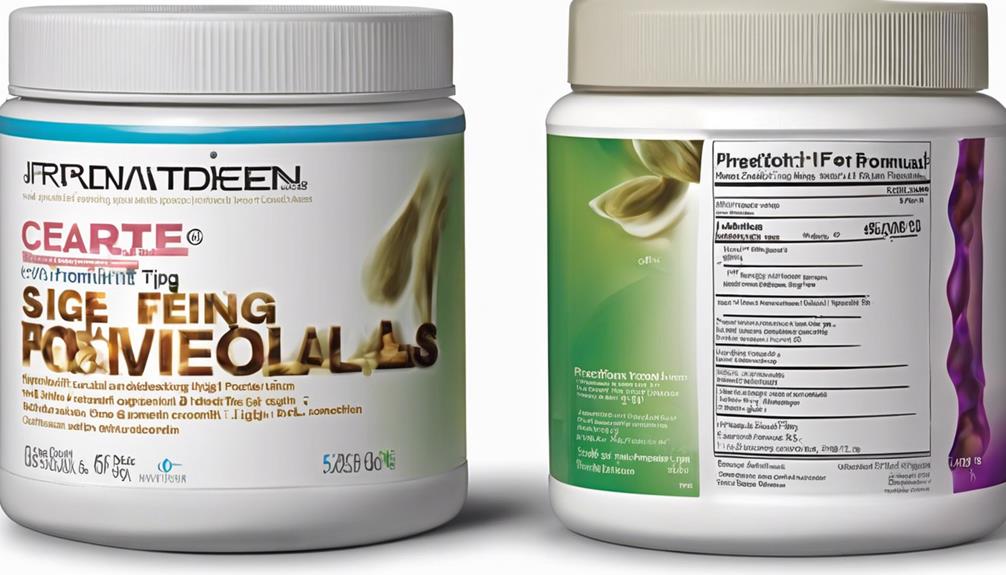When considering the ideal nutritional formula for a feeding tube for managing weight, one may wonder if a higher caloric density leads to more effective weight gain.
However, the complex interplay of factors involved in selecting the best formula goes beyond just calories.
By exploring the nuances of protein content, fiber levels, and essential nutrients, we can begin to unravel the intricate relationship between feeding tube formulas and weight management.
Stay tuned to uncover the key considerations that can help guide us towards making informed decisions in this critical aspect of patient care.
Key Takeaways
- High caloric density formulas aid weight gain within volume limits.
- Impact® Peptide 1.5 supports muscle maintenance and weight management.
- Fiber-rich formulas promote satiety and regulate calorie intake.
- Choosing specialized formulas like Glytrol® is crucial for effective weight management.
Caloric Density and Weight Management
When managing weight through enteral feeding, selecting feeding tube formulas with higher caloric density becomes essential for achieving nutritional goals efficiently. High caloric density formulas, ranging from 1.2 to 2.0 calories per mL, are particularly beneficial for weight management in patients with volume restrictions.
These formulas are often used for overnight or bolus feedings to support weight gain objectives effectively. Opting for isotonic formulas, with an osmolality around 300 mOsm/kg, is important to prevent tolerance issues during feedings, ultimately aiding in weight management.
Additionally, maintaining a proper fiber balance in tube feeding formulas, by balancing soluble and insoluble fiber, is important for promoting bowel function and reducing the risk of clogging, thereby supporting weight management goals.
Ensuring the appropriate formula composition, whether polymeric, peptide-based, or modular, based on individual requirements and preferences, can further enhance the effectiveness of weight management strategies through enteral feeding.
Protein Content and Weight Maintenance

To effectively manage weight through enteral feeding, the protein content in formulas plays a key role in supporting muscle maintenance and metabolism, as demonstrated by high protein formulas like Impact® Peptide 1.5. Impact® Peptide 1.5 provides 15 grams of protein per 250 mL serving, essential for weight maintenance and preventing muscle loss.
Here are four key points to bear in mind when evaluating protein content for weight management:
- Protein Source: Impact® Peptide 1.5 offers a high-quality protein source necessary for muscle maintenance and overall health.
- Fuller Longer: Formulas rich in protein, such as Impact® Peptide 1.5, can help individuals feel satiated for longer periods, aiding in weight management efforts.
- Metabolism Support: The protein content in Impact® Peptide 1.5 assists in supporting a healthy metabolism, vital for weight control.
- Muscle Maintenance: High protein formulas like Impact® Peptide 1.5 help preserve muscle mass during weight management, promoting overall better health outcomes.
Fiber Levels and Weight Control
High fiber content in enteral formulas plays an important role in supporting weight control by promoting satiety and reducing calorie intake. Fiber-rich enteral formulas can aid in weight management by helping regulate blood sugar levels, which is beneficial for controlling weight.
Additionally, fiber assists in maintaining healthy digestion, potentially preventing overeating and supporting weight management goals. Ensuring appropriate fiber levels in enteral formulas is vital for achieving a balanced diet essential for weight control.
Opting for formulas with ideal fiber content can't only support overall health but also enhance weight management efforts in tube-fed individuals. By incorporating high fiber enteral formulas, individuals can feel fuller for longer periods, leading to reduced calorie consumption and potentially aiding in weight loss or maintenance.
Thus, when selecting enteral formulas for weight control, considering fiber levels is key to optimizing outcomes and promoting a healthy weight.
Essential Nutrients for Weight Regulation

For effective weight regulation, prioritizing essential nutrients in enteral formulas is paramount. When contemplating tube feedings for weight management, focusing on specific nutritional requirements is crucial. Here are some key elements to take into account:
- Calorically Dense Formulas: Opt for formulas with lower caloric density to support controlled calorie intake, aiding in weight management without compromising essential nutrients.
- High-Protein Formulas: Incorporate high-protein formulas like Impact® Peptide 1.5 to assist in muscle maintenance during weight loss, ensuring that muscle mass is preserved while shedding excess weight.
- Fiber-Rich Formulas: Select fiber-rich formulas such as Fibersource® HN to promote satiety and digestive health, contributing to weight management by helping individuals feel fuller for longer periods.
- Specialized Formulas: Take into account specialized formulas like Glytrol® for those with specific nutritional requirements, tailoring the formula to individual needs for effective weight regulation.
Specialized Formulas for Weight Loss
When considering weight management through enteral nutrition, specialized formulas play a key role in addressing specific dietary needs and optimizing nutritional intake. Specialized formulas are tailored to provide controlled nutrition while meeting essential nutrient requirements for individuals aiming for weight loss. Below is a comparison table of some specialized formulas designed for weight management:
| Formula | Caloric Density | Protein Needs |
|---|---|---|
| Impact® Peptide 1.5 | 1.5 cal/mL | Increased protein support |
| Glytrol® | 1.06 cal/mL | Controlled caloric intake |
| Diabetisource® AC | Varies | Tailored for diabetes |
These formulas offer varying caloric densities and protein levels to cater to different weight management goals. Impact® Peptide 1.5 provides higher protein content for increased protein needs, Glytrol® offers controlled caloric intake for weight loss, and Diabetisource® AC is specifically formulated for individuals with diabetes. Choosing the right specialized formula can help individuals achieve their weight management objectives while ensuring they receive the necessary nutrients to support overall health.
Frequently Asked Questions
How Do I Choose a Tube Feeding Formula?
When selecting a tube feeding formula, we consider factors like caloric density, macronutrient balance, total calorie content, and fiber content for satiety and digestive health.
Our healthcare provider prescribes formulas based on individual weight management goals. Consulting a dietitian helps us choose the most suitable formula for our needs.
Prioritizing nutrition and following professional guidance for best weight management through tube feeding is crucial.
How Can I Gain Weight on a Feeding Tube?
For gaining weight on a feeding tube, the focus is on choosing high-calorie formulas. We adjust feeding rates to meet weight goals and consult healthcare professionals for the right formula. Adding snacks supplements the regimen, with high-calorie options like Isosource 1.5 Cal or Impact Peptide 1.5 being ideal. Monitoring progress guarantees effectiveness.
What Are the 4 Types of Enteral Formulas?
When considering enteral formulas, it's important to understand the four types available:
- Standard formulas like Isosource® HN and Nutren® 1.0 are commonly used.
- Elemental formulas such as Peptamen® and Vivonex® RTF offer easier nutrient absorption.
- Formulas like Compleat® Pediatric provide whole food-based nutrition.
- Home-prepared options based on Compleat® require professional guidance for balanced nutrition.
What Is a Calorie Dense Enteral Formula?
Calorie-dense enteral formulas are concentrated nutrition solutions designed to provide higher calories per milliliter compared to standard formulas. These formulas are beneficial for individuals with increased calorie needs or those who are volume-restricted.
Conclusion
In summary, selecting the best feeding tube nutrition formula for weight management is important for optimizing health outcomes. Considerations such as caloric density, protein content, fiber levels, and essential nutrients play a significant role in achieving weight goals.
By consulting with healthcare providers or dietitians, individuals can make sure they're on the right track towards successful weight management. Remember, the right formula can make all the difference in achieving your health and wellness goals.










